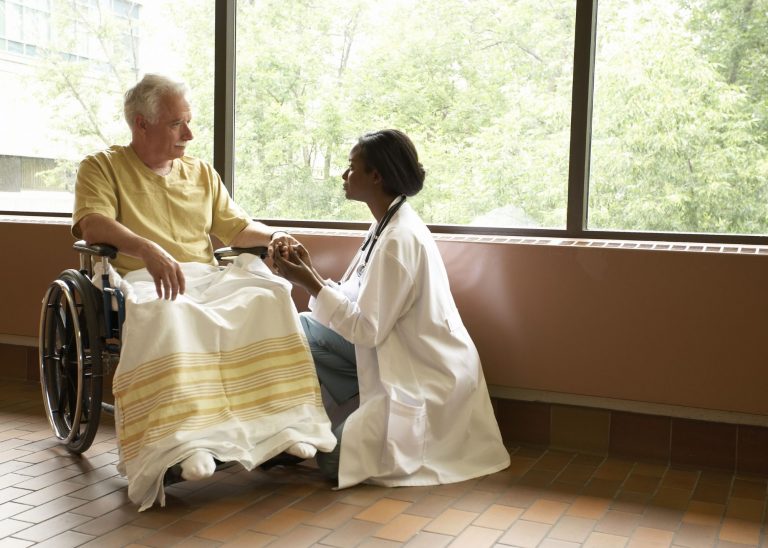There are many myths about hospice care. Often, these misconceptions keep people and their loved ones from getting the care and support they need at a time when they need it most. Being informed is the first step in making complex healthcare decisions and in experiencing the improved quality of life that hospice care offers patients and their loved ones.
Hospice is not a place
Hospice is a philosophy of care, not a place. The goal of hospice is to provide care where people are most comfortable – at home. Therefore, most patients receive care right where they live: in a private residence, assisted living community, skilled nursing facility, or even in a hospital. Care focuses on pain and symptom management, as well as reducing stress and anxiety, to improve quality of life. At end of life, it provides a dignified, peaceful death.
Hospice isn’t about giving up on life
When curative treatment is no longer available or desired, hospice care allows people to live in comfort and dignity for whatever time they have left. The focus is on quality of life instead of a cure. Individualized plans of care allow patients to determine what is most important to them while receiving care. Goals are re-evaluated as the illness progresses, allowing patients and their loved ones to remain in control of their care.
Superior Senior Home Health has actually supported many patients in realizing bucket list wishes while receiving hospice care: taking one last trip to the beach, meeting their rock ‘n roll hero, marrying the love of their life, and realizing a lifetime wish to exhibit their artwork, just to name a few.
Hospice is not only for the last days of life
When people hear that someone they know is in hospice care, many of them think that means that the person only has days to live. Unfortunately, that is the case for too many as most people are referred to care when they are already actively dying. The fact is that hospice care provides months of improved quality of life for patients and their loved ones.
Hospice’s interdisciplinary care teams provide “whole body” care in that they address not only physical needs, but also psychosocial and spiritual needs. They also provide much needed support, education and respite to family members/caregivers. Receiving the maximum benefit from hospice care is dependent on starting care early.
We hear it far too often from family members: “I wish I had called hospice sooner.”
Hospice is not just for cancer patients
Cancer patients represent approximately 37% of hospice patients. The rest have some other life-limiting illness such as heart disease, COPD, liver disease, kidney failure, ALS, Alzheimer’s disease, stroke or any other terminal illness eligible for hospice care.
Hospice is not expensive
Hospice is covered by Medicare, Medicaid and most private insurance companies. This includes all care, medications, medical equipment and supplies associated with a patient’s primary illness.
Hospice is not religiously affiliated
Hospice chaplains respect the spiritual beliefs, faith traditions, and practices of all individuals. Chaplains provide spiritual care that patients and families find comforting, whether they consider themselves religious or not. They help patients explore their unique sources of faith and hope, recognize their own spiritual nature and individual practice of faith, or just provide a compassionate caring presence and listening ear.
Hospice does not hasten death
Many people think that hospice hastens death because many times, as soon as they hear someone is receiving hospice care, they learn this person has died. This has to do with when the patient was referred for care and is not an indication that hospice care hastened their death. The goal of hospice care is to improve quality of life for patients and families for whatever time they have left.
There are no studies that show that hospice care quickens death, however, there are studies that prove that hospice patients may actually live longer than patients who do not receive hospice care.
Hospice does not deny nutrition
Many people think that hospice care involves starving people. That is simply not true. Hospice patients are not denied food or liquids. However, as a person’s illness progresses and they near death, most patients will begin to eat and drink less and less. This is because the body is simply not expending energy and is also no longer able to process foods and liquids. This is completely natural and simply part of the dying process for many patients. The lack of food and liquid does not hasten death, cause the patient pain, or cause starvation.
Anyone can refer someone for hospice care: family member, friend, pastor, and, yes, your doctor
Far too often, people wait for their doctor to recommend hospice care before they consider this type of care for themselves or their loved one. By simply calling Superior Senior Home Health, we can assess if care may be appropriate. If you start noticing decline in status such as increasing amounts of pain medications, doctor visits or Emergency Department visits; inability to bathe, dress, or prepare meals; frequent falls; unexpected weight-loss; and/or spending more time confined to a bed or chair, it’s time to start finding out more. This way care can start sooner and improved quality of life may be possible for months.
Superior Home Health and Hospice offers a complimentary consultation with an advisor to help you determine your loved one’s home health and hospice needs. To schedule your free consultation, call 805.742.4514 or contact us online. We’re proud to provide exceptional hospice and home care in Santa Maria, CA and throughout the surrounding areas.

